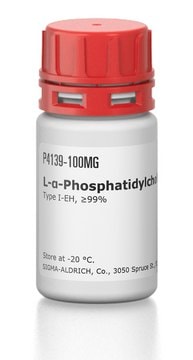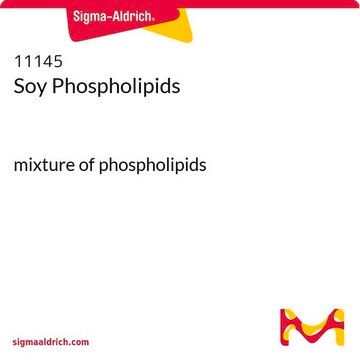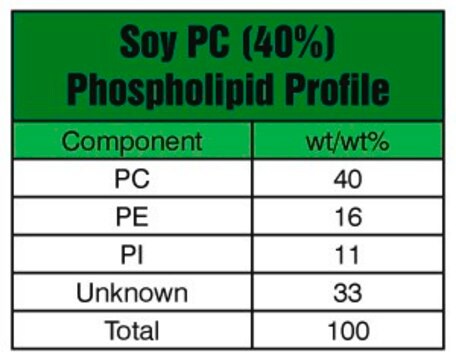P5638
L-α-Phosphatidylcholine
from soybean, Type II-S, 14-29% choline basis
Synonym(s):
1,2-Diacyl-sn-glycero-3-phosphocholine, 3-sn-Phosphatidylcholine, L-α-Lecithin, Azolectin, PC
About This Item
Recommended Products
biological source
soybean
Quality Level
type
Type II-S
form
powder or solid
concentration
14-29% (choline)
functional group
phospholipid
lipid type
phosphoglycerides
shipped in
ambient
storage temp.
2-8°C
InChI
1S/C42H80NO8P/c1-6-8-10-12-14-16-18-20-21-23-25-27-29-31-33-35-42(45)51-40(39-50-52(46,47)49-37-36-43(3,4)5)38-48-41(44)34-32-30-28-26-24-22-19-17-15-13-11-9-7-2/h14,16,20-21,40H,6-13,15,17-19,22-39H2,1-5H3/b16-14-,21-20-/t40-/m1/s1
InChI key
JLPULHDHAOZNQI-ZTIMHPMXSA-N
Looking for similar products? Visit Product Comparison Guide
General description
Typical lots of purified soybean phosphatidylcholine have fatty acid contents of approximately 13% C16:0 (palmitic), 4% C18:0 (stearic), 10% C18:1(oleic), 64% C18:2 (linoleic), and 6% 18:3 (linolenic) with other fatty acids being minor contributors. This would calculate to an average molecular weight of approximately 776.
Purified phosphatidylcholine is soluble in chloroform and ethanol.
Other major phospholipid components include phosphatidylethanolamine and inositol phosphatides. Other phospholipids and neutral lipids such as triglycerides, tocopherols, and sterols may be present. Carbohydrates may also be present.
A procedure for determination of the amount of oxidation of egg phosphatidylcholine in a liposome preparation by measurement of the oxidation index has been published. The oxidation index is the ratio of the absorbance at 233 nm to the absorbance at 215 nm. The latter wavelength was chosen since there is little contribution of the fatty acid carbonyl to the absorbance at this wavelength, allowing Beer′s Law to be followed.
A method of determining choline content has been published.
Biochem/physiol Actions
Phosphatidylcholine is used for preparation of vesicle suspensions, commonly called liposomes, or as monolayers. Monolayers have been formed using a solution of 1% soybean phosphatidylcholine in hexane.
Valinomycin-induced changes in membrane potentials of red blood cell and phospholipid (phosphatidylcholine from egg yolk plus cholesterol) vesicle suspensions have been measured using positively-charged, cyanine dyes that fluorimetrically responded to the change in potential.
Purified rhodopsin has been incorporated into soybean phosphatidylcholine vesicles.
Quality
Storage Class Code
11 - Combustible Solids
WGK
WGK 1
Flash Point(F)
Not applicable
Flash Point(C)
Not applicable
Personal Protective Equipment
Certificates of Analysis (COA)
Search for Certificates of Analysis (COA) by entering the products Lot/Batch Number. Lot and Batch Numbers can be found on a product’s label following the words ‘Lot’ or ‘Batch’.
Already Own This Product?
Find documentation for the products that you have recently purchased in the Document Library.
Customers Also Viewed
Our team of scientists has experience in all areas of research including Life Science, Material Science, Chemical Synthesis, Chromatography, Analytical and many others.
Contact Technical Service








